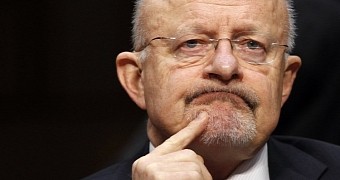James Clapper, former Director of National Intelligence, once more expressed his desire that law enforcement be able to easily crack encryption delivered to Internet users via a wide range of apps and tools.
"The so-called going dark phenomenon - a situation that was drastically accelerated by the Snowden revelations - n our country, I don't think we're in a good place here. I think there needs to be a very serious dialogue about giving criminals, terrorists, rapists, murderers, etcetera, a pass," Clapper said at the National Press Club.
He references the fact that Edward Snowden's NSA leaks, which detailed dozens of ways the intelligence agency snooped on people, both those under investigation and those that had done nothing wrong, have triggered a business-wide implementation of encryption protocols in apps and other communications tools.
This, of course, is completely true, as numerous companies, including Google, Facebook, Apple and so on have enabled end-to-end encryption on their services. Furthermore, numerous encrypted email services have surfaced, as well as messaging apps that promise complete privacy, such as Telegraph, Signal, or even WhatsApp.
There was even a huge scandal regarding the iPhone which has a device-based encryption that didn't allow Apple to help out the authorities during its investigation into the San Bernardino shooting.
Creativity and innovation should do the trick
Clapper expressed his hope that tech giants will mix some creativity with innovation to turn encryption into something that both protects people's privacy and also allow authorities to access the content should they need this.
"One of the approaches that might have promise, I don't know, would circle back on a system of key escrow where not one party necessarily would have the keys to the kingdom from an encryption standpoint. Where there might be three independent, separate, autonomous elements that would have to prove the provision of encryption in order to solve a crime or detect a terrorist attack, for example," Clapper said.
While allowing authorities to have access to communications of terrorists would be great, for instance, this would weaken encryption for everyone. With the way the NSA or CIA secret documents have been leaking left and right, and not only due to whistleblowers, how can they be trusted to hold some universal keys of decryption for various apps and devices? How can the world be sure that those keys won't be stolen by hackers or, perhaps more likely, misused by Government intelligence workers?

 14 DAY TRIAL //
14 DAY TRIAL //